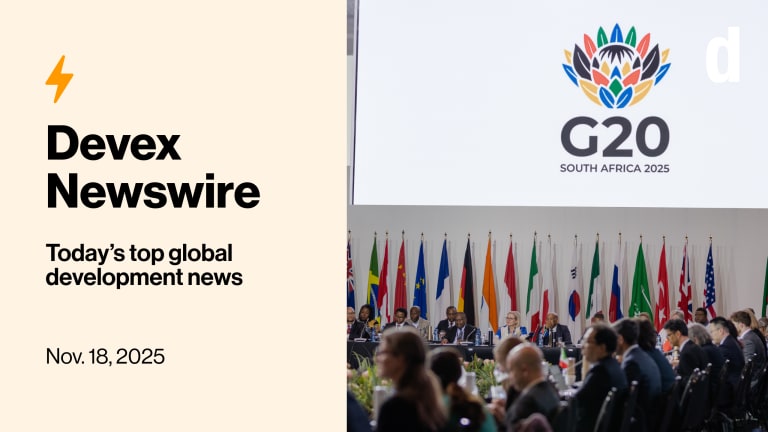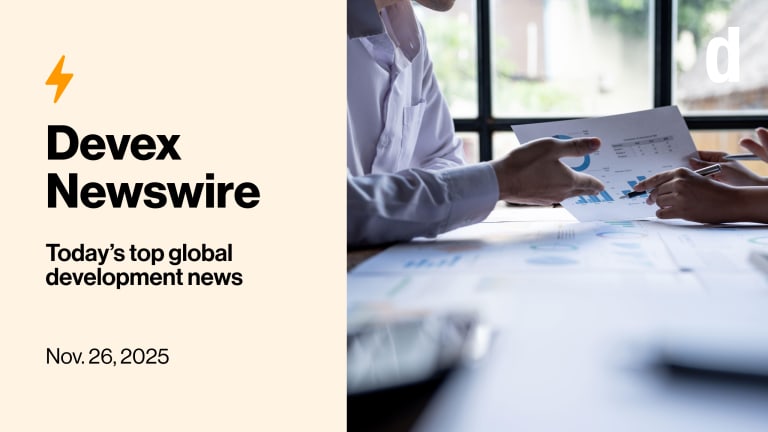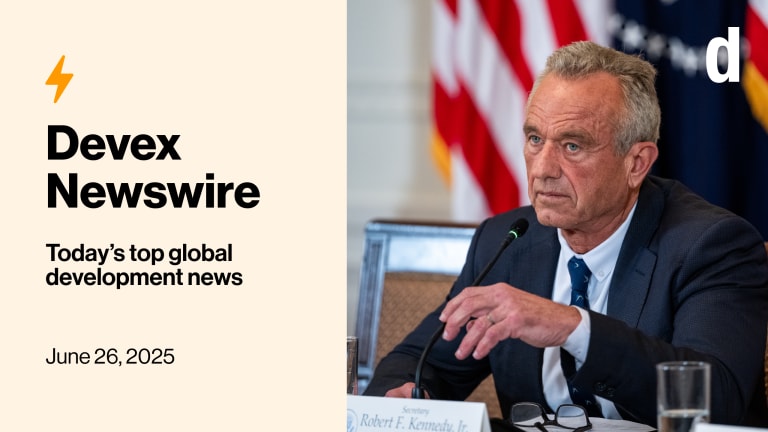
Syria’s new leadership has sparked rare optimism, but the momentum is fading fast. Aid cuts, bureaucratic hurdles, and a lack of transparency threaten to stall recovery just as it begins.
Also in today’s edition: We look at how Gavi is reaching “zero-dose” children in conflict areas, and whether development banks can adapt as quickly as they need to.
+ Up for a quick challenge? Take our five-item news quiz.
Spring forward
Syria is at a turning point. Bashar al-Assad is out, Ahmed Al-Sharaa is in, and after 14 years of war, people hit the streets in celebration. But while the political shift opened a rare window for rebuilding, that window’s already starting to close, my colleague Jesse Chase-Lubitz writes.
“I think we all recognize that this is going in the right direction … but there is a timing aspect,” says Mercy Corps’ Mathieu Rouquette.
Qatar and Saudi Arabia cleared $15 million of Syria’s World Bank debt. U.S. President Donald Trump eased sanctions. The EU’s following. Hope, right? Maybe — but funding is vanishing. “The U.S. funding cuts have been a terrible blow,” says UNDP’s Sudipto Mukerjee.
NGOs are chasing money from the Persian Gulf States, but it’s a gamble. “I think it’s going to be patchy,” says Robert Beschel of the Middle East Council on Global Affairs. “This is an area where what happened with the USAID is really going to hurt.”
“There are a few Gulf countries which seem to be ahead of the game in terms of their immediate offers to support Syria,” Mukerjee says. But so far, “nothing has happened.”
Trump’s recent Middle East visit and lifting of U.S. sanctions may help, experts say. Still, transparency about what is being funded could take a hit. “I think 80% to 90% of that will disappear,” Beschel warns.
Read: Change is coming to Syria. Can the aid sector seize the opportunity?
Under pressure
With U.S. and European aid drying up, multilateral development banks are being urged to step up — and the Fourth International Conference on Financing for Development, or FfD4, happening from June 30 to July 3, will be a key moment. Devex’s Road to Sevilla briefings are teeing up the debate, and last week, several heavy hitters debated whether MDBs can reform fast enough.
“What the MDBs offer for the rest of the world is leverage and impact in a way that almost no other organizations offer,” said Brookings Institution senior fellow Homi Kharas. “People are looking to the MDBs to leverage their resources. They’re looking to the MDBs for much more impact.”
“We need leverage, impact, scale, speed, and then, you get better results,” added Vera Songwe, board chair of the Liquidity and Sustainability Facility.
Kharas, Songwe, and fellow Brookings expert Richard Samans all agreed MDBs should stretch their balance sheets — and worry less about clinging to AAA ratings. Samans argued they can ramp up lending “without jeopardizing their MDB triple A rating ... and on the IMF side, without increasing the price level globally.”
Kharas summed up the urgency: “If you are driving off a cliff, does it really matter if you drive off the cliff at a high speed or a slow speed? If you don’t brake in time, you go off the cliff, you’re still gone.”
Read more: Can multilateral development banks step up to meet the moment? (Pro)
+ With debt pressures mounting and aid budgets shrinking, this month’s FfD4 in Sevilla isn’t just another summit — it’s where development’s financial future could be rewritten. Ahead of the talks, Devex Pro is hosting a special online event series to unpack what’s really at stake. Tomorrow, June 3, Iolanda Fresnillo, David Grigorian, Eric LeCompte, and Hannah Ryder will discuss the politics, power dynamics, and reform proposals shaping the global debt conversation. Save your spot now.
Opinion corner
Given the state of the development sector over the last five months, it’s not surprising that our top op-eds from May are focused on bounceback and picking up pieces.
• Resilience may be something our global development community is leaning into, given the current state of affairs. But according to Jess Ayers of Quadrature Climate Foundation, resilience can be so much more than just the ability to bounce back after a shock. In her opinion piece for Devex, Ayers writes that resilience also means working to improve the state of affairs of the system in which we experience a shock:
“Simply bouncing back assumes the status quo is adequate. It’s not. The current global system — one that drives climate catastrophe, deepens poverty, fuels inequality and conflict, and restricts civic freedoms — is not a desirable end state.” She writes that resilience is emerging as one of climate philanthropy’s most critical strategies, with funding going to projects that tackle climate and human vulnerability together. Curious about these projects? Read some examples.
• In terms of tackling climate, you may be waiting with bated breath for signatories to the Paris Agreement to provide their emissions control plans — known as NDCs — and due in September. Some star pupils of the class of 2025 have already submitted their plans by the original February deadline — but what the FAIRR Initiative’s Helena Wright would like to see is a much bigger place given to agriculture in all NDCs.
Agriculture is a big driver of emissions, and it seems only sensible that including granular targets on controlling land-use change, reducing agricultural emissions, and promoting sustainable diets and less food waste should be a thing. We’ll wait and see how the 95% of countries that have yet to present their NDCs do on that front.
• Foreign service veteran John Groarke has some advice from his 30 years of experience, during which time he was a four-time USAID mission director:
“Sustainable development assistance requires strategic, government-backed approaches that build self-reliance, not well-meaning charity that creates dependency.” If you are a part of those nongovernment groups looking for somewhere to start picking up the pieces, read Groarke’s opinion piece for Devex.
ZIP codes
When vaccinators arrived in the village of Bopo, Cameroon, in March, Shangceline Atia was thrilled. “This is the first time they are being vaccinated,” she says of her three kids. Conflict had kept health workers out of her village for nearly a decade, Devex contributing reporter Catherine Davison writes.
Her children are among 14.5 million globally who hadn’t received a single routine shot — referred to as “zero-dose” children — until vaccine alliance Gavi’s new Zero-Dose Immunization Programme, or ZIP, came to town.
“What we're doing differently here is that we're bringing that full vaccine schedule,” says Gavi’s Amy Ratcliffe. “This is truly new. This is what excites me about ZIP.”
Since late 2022, ZIP has delivered over 800,000 first doses in hard-to-reach areas. In Cameroon, local partners such as the Cameroon Baptist Convention Health Services help bridge mistrust. “People are afraid to come here,” Atia says. “Because when they come, [the armed groups] will hold them hostage.” But CBCHS is seen as neutral and works with pastors and health workers to build trust. “We would have refused,” Atia adds, “because there are rumors that some of these vaccines are dangerous.”
ZIP is still evolving. “We’re more engaged than a typical donor might be,” Ratcliffe says. And while Gavi funding is at risk, along with that of many big health organizations, she’s hopeful: “This is the coolest project I’ve worked on in my entire career.”
Read: How Gavi is reaching ‘zero-dose’ children in conflict areas (Pro)
+ Not yet a Devex Pro member? Start your 15-day free trial today to access all our expert analyses, insider insights, funding data, events, and more. Check out all the exclusive content available to you.
In other news
Gaza’s health ministry says more than 30 people died after Israeli soldiers fired at a distribution site in Gaza on Sunday, though the U.S. based Gaza Humanitarian Foundation denied any deaths. [Reuters]
The resumed second session of the UN-Habitat Assembly in Nairobi wrapped up Friday and saw the adoption of a new strategic plan for 2026-2029 to tackle the global housing crisis. [Xinhua]
The U.S. State Department plans to shut down the office doing resettlement efforts for Afghans who helped the American war effort. [Bloomberg]








